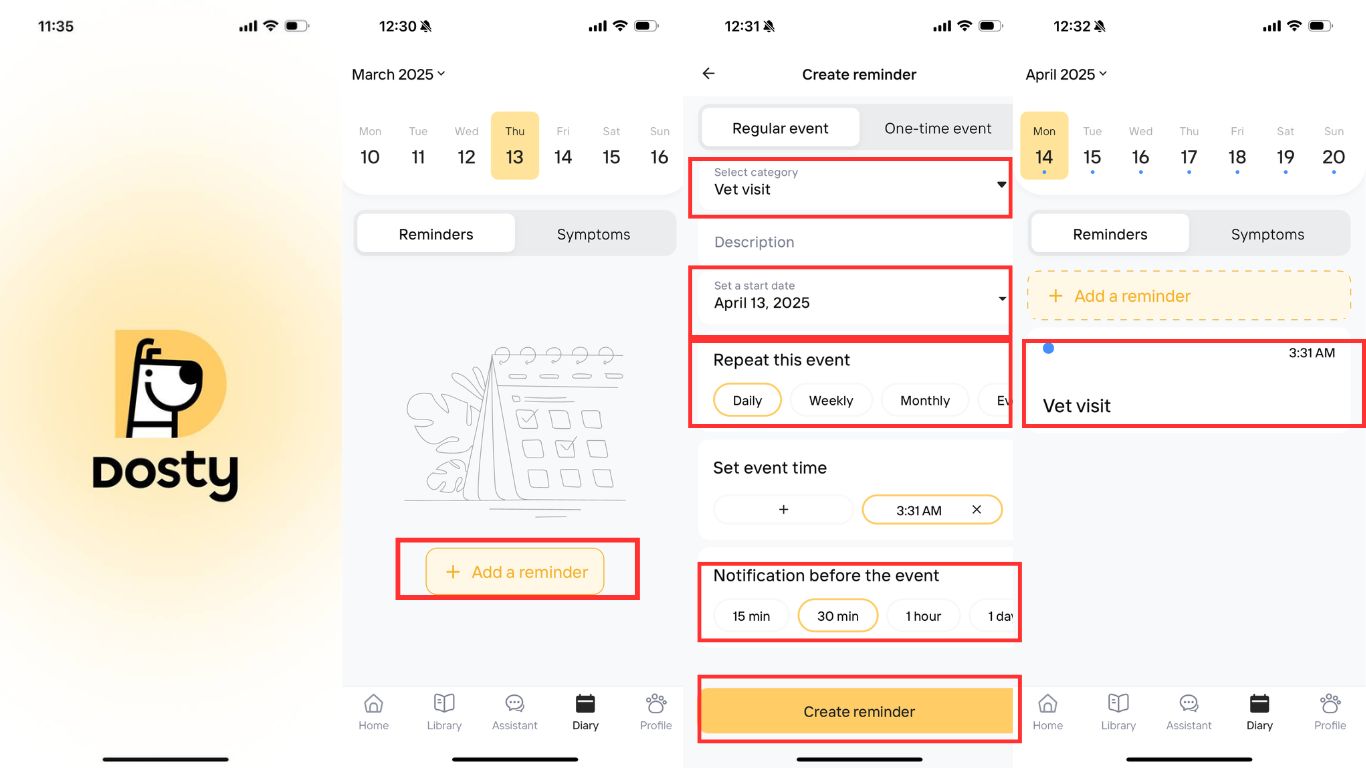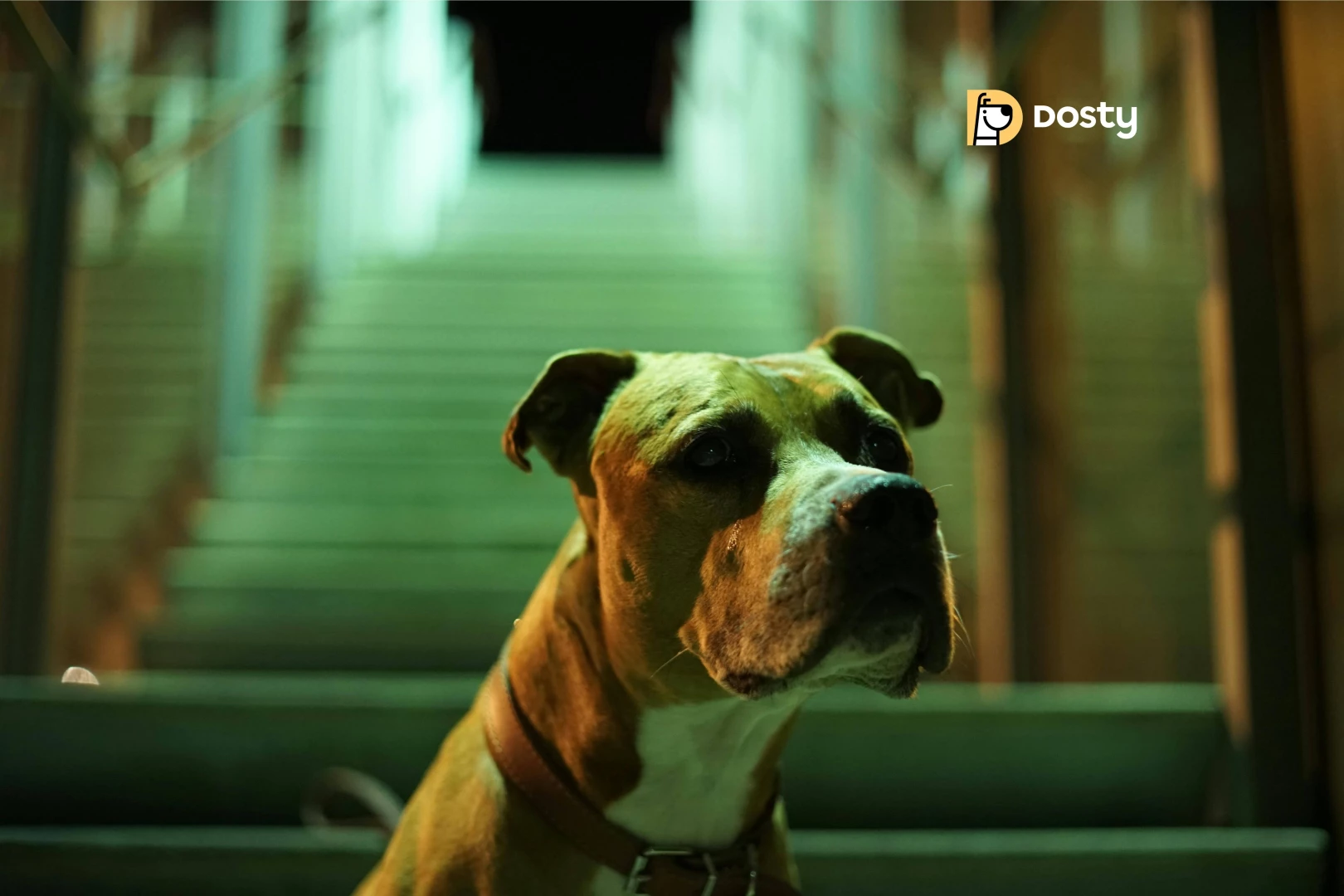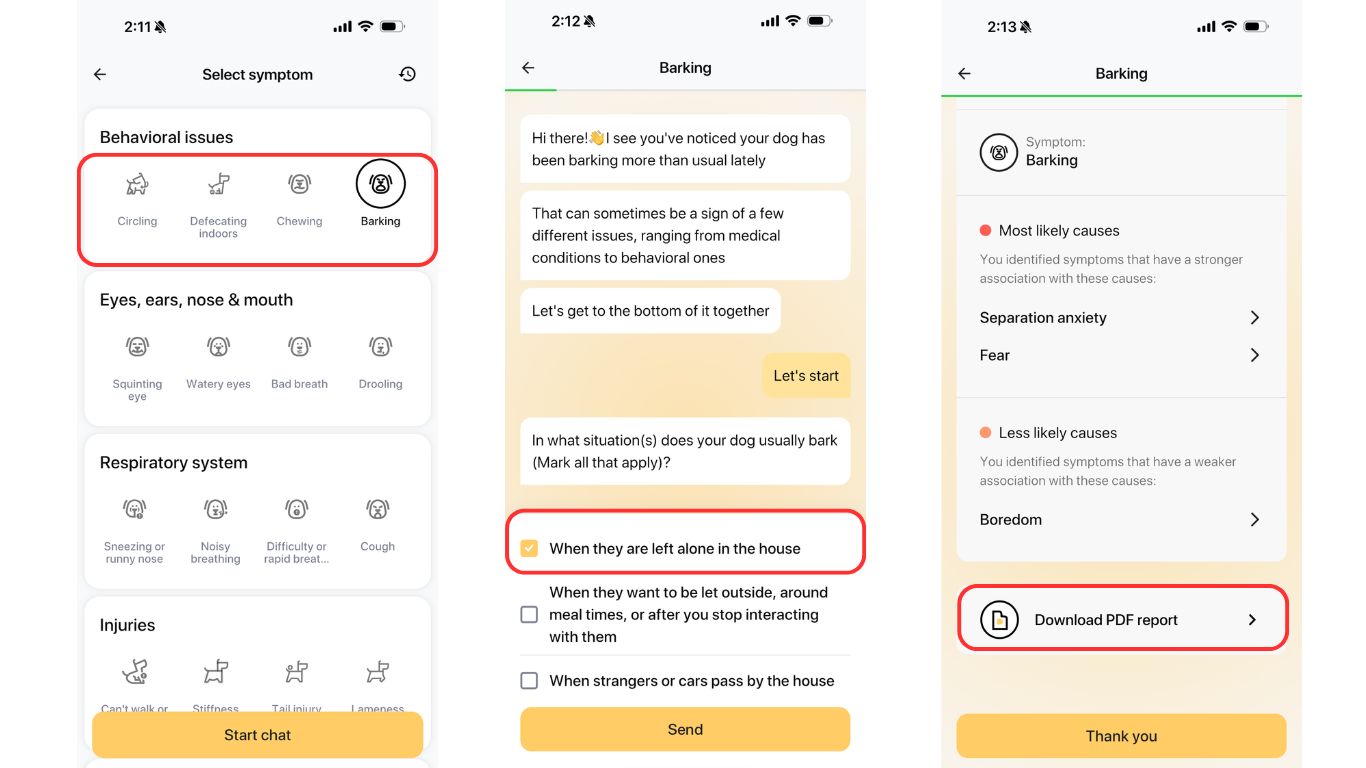On this page
Why Do Dogs Bark at Night?
Dogs bark at night for a number of reasons, including to alert owners, protect property from other animals and as a form of anxiety dealing with separation from owners. Night dog barking is usually due to not enough exercise, or environmental triggers. Dr. Janet Roark says dogs bark more during the night when they’re bored either mentally or physically. You need to recognize the motivated cause of your dog’s barking so that you can properly respond to it.
Listen to the Bark not the Noise❗
Anxiety, boredom, or a health sign, Dosty helps you dig deep to find the true cause of all that nighttime barking.
Track behavior patterns
Set reminders for walks, playtime, and vet visits
Receive insights from your chat assistant in real time
Recognize symptoms early and take action with confidence
🌙Sleep more peacefully, for you and your dog both. Try Dosty.

Common Reasons for Nighttime Dog Barking
There are various reasons why dogs bark at night including loneliness, poor health, weariness and lack of exercise, or inadequate night-time care. Address the root cause, because that is what takes contamination away.
🔹Territorial Behaviour: Dogs naturally protect their domain, so barking can be used to warn off potential threats, even if it’s something as far away as a noise or shadow.
🔹Separation Anxiety: Some dogs bark for comfort or companionship when left alone at night.
🔹Physical Pain or Lack of Comfort: Arthritic joints, upset stomachs, and dental problems often flare up at night when you’re less distracted.
🔹Leftover Energy: Dogs can be restless if they don’t get enough exercise or mental stimulation.
“It’s easy to blame a dog’s barking at night on a behavioral problem such as lack of exercise, but it is more likely to be a symptom rather than a cause,” says Dr. Jeff Werber, a board-certified veterinary behaviorist. Your role is to see what’s causing that.”
Eliminating environmental triggers is key to curbing excessive barking.
Are Dogs Reacting to Noises or Other Animals?
Yes, dogs do bark at night for a plethora of different reasons from other animals sounds to something that creeps the hell out of them, the possibilities are nigh on endless. Dogs are responsive to cues humans can't see.
🔸 Wildlife Activity: Dogs, particularly in suburban settings, are often altered by things like raccoons or opossums.
🔸 Street Noises: Barking tends to surge when dogs hear car doors, sirens and night joggers.
🔸 Ultrasound: Bug repellents and HVAC systems can disrupt a dog’s sensitive hearing.
Decreasing the auditory cues can help in greatly reducing dog barking at night time.
Is Your Dog Barking Due to Boredom or Anxiety?
Yes, dogs bark at night out of boredom or anxiety as they do not get enough mental or physical stimulation or if they feel alone. Dog barking through the night is often driven by emotional anxiety.
Dog Barking can be characterized by the barking is struggling to be repetitive, high-pitched and occurring often. Dogs are pack animals and like to bark in search of attention or play.
Symptoms of a Bored Dog That Barks:
- Barking at same time every night.
- Chewing or pacing.
- Energy spikes out of nowhere, right before bed time.
Enrichment for Dog Barking at Night:
- Add puzzle feeders after dinner.
- Plan a walk 1–2 hours before bed.
- Rotate toys on a weekly basis to avoid habituation.
If your dog is sufficiently stimulated but still barks, pain may be the cause.
Not sure if it’s boredom, anxiety or something deeper❓
Dosty helps you figure it out quick.
Response guided behavior questions
See the most common culprits
Get instant reporting on the symptoms
Receive real insights for enrichment
🐾 Stop guessing. Begin learning with Dosty.
Could Your Dog Be Barking Because of Discomfort or Pain?
Yes, barking at night could be a sign that your dog is in pain, such as howling or whining when moving, loss of appetite, or lameness. Health-related barking is most often at its worst when the house is the quietest.
Pain and discomfort are among the potential “silent” stressors which may manifest as nighttime dog barking. Painful dogs will often make more noise when the house is quiet and there is little happening to stimulate them.
Health Conditions That Cause Dog Barking at Night:
- Arthritis in older dogs.
- Dental pain or infected gums.
- Digestive upset or bloating.
Signs That Your Dog Is Barking in Pain:
- Barks grow in ferocity as the siren urges them on.
- Your dog doesn’t want to lie down or moves a lot.
- Obvious limp or licking at an area.
Don’t dismiss medical causes. If new barking habits develop suddenly or become more frequent, always check in with your vet.
How to Stop Your Dog from Barking at Night
To help you stop dog barking at night, understand that your dog has a reason for it, create routines, train your dog, and check medical condition by consulting vet.
If you want to successfully stop dog barking at night you have to work on behavior as well as cause. Begin with a good assessment.
Immediate Steps:
- Put dog on a schedule for a vet visit to rule out illness.
- Get your baby into an evening routine (Play, Feed, Calm).
- Create a quiet, comfortable sleep environment free of distractions.
Pair environmental changes with behavior change to notice long-lasting changes
What Are the Best Training Methods?
The most effective training for getting your dog to stop barking at night include crate training, positive association, ignoring attention-seeking barking and, as always, consistency.
Positive Reinforcement for Dog Barking Control:
- Crate Training: Builds confidence and routine.
- Positive Reward: Give treats for being quiet instead of discipline for being noisy.
- Ignore Small Barking: Do not react to help break the reward cycle.
“The incorrect response, such as yelling, can amp up anxiety,” Dr. McCauley warns. Stay consistent and calm.”
🎯 Train Smarter, Not Louder
Dosty will help show you how to understand, track and train your dog out of nighttime barking the right way.
✅ Log barking activations and progress
✅ Receive expert-approved training tips
✅ Instant access to step-by-step guides within the app
✅ Establish the habit with daily reminders
Smart habits start with quiet nights — start with Dosty.
When Should You Talk to a Vet or Behaviorist?
Consult a vet or behaviorist about nighttime dog barking if it comes on suddenly, gets worse or doesn’t respond to ongoing training and environmental changes.
If nighttime dog barking becomes excessive and chronic, or if the problem worsens after a period of improvement dog owners should consider getting professional help.
Consult with a Veterinarian or Behaviorist If:
- Onset involved more-or-less abrupt barking escalation.
- Panting, pacing, or signs of pain when barking occurs.
- Training doesn't help at all in 2-3 weeks.
Find board-certified veterinary behaviorists (DACVB) or certified applied animal behaviorists (CAAB).
❗If your dog’s barking in the middle of the night continues, it could be more than a barking habit.
Dosty is designed to help you be proactive.
Schedule recurring vet visits
Schedule reminders with your own custom alerts
Log symptoms and monitor their evolution over time
When to call in a professional
Be smarter with your reminders with Dosty.

FAQs About Nighttime Dog Barking
1. Can dog barking at night be trained out completely?
Yes, but only after pain or anxiety has been ruled out.
2. Should I let my dog bark it out?
Not if it’s health-related. For attention gathering a little ignoring might work if done very consistently.
3. Does exercise reduce dog barking?
Absolutely. A tired dog will be more inclined to sleep soundly.
4. Should I feed my dog late at night?
No, feeding late can create digestive upset resulting in a restless night and barking.
5. Do anti-bark devices work?
The majority of vets discourage the use of shock collars. Replace them with humane, evidence-based training.
Conclusion – Helping Your Dog Sleep Quietly Through the Night
Stopping your dog barking at night may take understanding why they bark in the first place, and then once you know the reason, use good, solid training, enrichment, or even a professional behaviourist to help your dog sleep well and behave beautifully at night.
A dog barking at night is not only an annoyance, it’s also a form of communication. Whether it’s boredom, pain, or environmental stress, treating the cause means better sleep for all.
Final Tips:
Make vet checks for pain and illness a priority.
Employing positive reinforcement training.
Talk to an expert if barking continues.
🌙 Transform restless nights into restful ones with Dosty App.


